- Home
- Andrea Penrose
Sweet Revenge Page 18
Sweet Revenge Read online
Page 18
Nor do I. Like truth, trust was a hard concept to capture in words.
“Yes, well, instead of debating our philosophical differences, milord, wouldn’t you rather hear about the letter,” she retorted.
“Por favor,” he muttered.
“It was mostly a passionate plea, bemoaning the loss of her favors in bed. I only took it because . . . well, Lady Spencer was careful to choose influential lovers. Having a bargaining chip with such men sometimes proves useful.” Arianna heard Henning add a splash of brandy to his glass. “As I said, I didn’t think it relevant.”
Saybrook released a pent-up breath.
“But in light of the present circumstances,” she went on, “his pleas about betrayal may have a more sinister meaning.”
“Before I comment on that, is there anything—anything—else you are holding back?”
Somehow, to give voice to the cryptic sheet of numbers and the folio of equations was to give them actual substance. And why? Her vague suspicions were absurd—absurd. To explain them would mean stripping away the last of her protective secrets.
“As far as I know, I possess no other information that may prove useful,” she replied carefully.
The earl looked less than satisfied with her answer, but he let it pass. “You are sure that the letter is from Kellton?”
“His hand is very legible. The signature reads, Your devoted servant Gideon Kellton. I wouldn’t imagine there are two rich men of that name.”
Clasping his hands behind his back, he began to pace the length of the kitchen. For some moments, the scuff of leather on stone overwhelmed all other sounds. Then it suddenly stopped.
“It seems to me,” he announced, “that it’s time to get reacquainted with Lady Spencer.”
“But—,” she began, then hesitated.
The earl fixed her with a mocking look. “You think I don’t qualify? I possess a title and wealth. As for my ability to meet her other requirements, I daresay I shall rise to the occasion.”
Arianna felt herself flush. To cover her embarrassment, she quickly said, “And starting tonight, I shall heat up my efforts to cozy up to Concord. It’s obvious that he and Lady Spencer are close. For what reason is something we need to find out.”
“You mean that you will tumble willingly into his bed?” asked Saybrook quietly.
“Yes. If need be.”
“No.” It was barely more than a whisper, but there was no mistaking the note of command.
She opened her mouth to retort, but Henning hastily intervened.
“Lady Arianna, I think what Sandro meant is, we certainly don’t expect you to, er, sacrifice your, er, virtue to ensnare these criminals.”
A laugh, bitter as bile, welled up in her throat, but Arianna forced it into a sardonic smile. “Mr. Henning, I’ve had to fend for myself since I was fifteen years old, and the West Indies are far more primitive than the fancy streets of Mayfair. I assure you, my virtue is not an issue.”
The surgeon looked uncomfortable, while Saybrook . . .
Arianna could not quite describe the earl’s expression. His dark eyes had a trick of turning opaque and allowing nothing to penetrate their depths.
“All questions of morality aside, I would suggest we try to avoid that scenario,” said Saybrook, his voice devoid of emotion. “It would place you in far too vulnerable a position. The smallest slip . . .” He shifted his injured leg. “We can assume that Concord is extremely dangerous and won’t hesitate to kill if he feels threatened.”
“You think Lady Spencer is any less dangerous for being a female?” she demanded.
Rather than reply, Saybrook turned his focus to another conundrum. “We cannot forget about Grentham, or how he fits into the puzzle.”
“I wuddna be surprised to find he is the one trying to put all these filthy pieces together,” growled Henning.
The earl seemed less certain. “I have heard that he is ruthless, but as far as I know, there are no rumors that he is corrupt.”
“Power always corrupts,” replied Henning darkly. “Besides, who else ordered a senior officer of the Blues to try to murder Lady Arianna, not to mention an under-governor of the East India Company?”
“I prefer to keep an open mind—”
A tenuous cough from the archway interrupted him. “Your pardon, milord.” One of the earl’s footmen held out a letter. “A messenger from Whitehall just delivered this. He said it was urgent.”
“Speak of the devil.” Cracking the seal, Saybrook skimmed over the contents and then looked up. “I am summoned for a meeting with the minister. As soon as possible.”
“Kellton?” asked the surgeon.
“It doesn’t say. But I would be surprised if he hasn’t heard of the death.”
“What do you plan on telling him?”
The earl shrugged. “That depends on how much he knows—or claims to know. Conversing with Lord Grentham is always a game of cat and mouse.”
Anxious to think over what she had just heard in the privacy of her own house, Arianna took up her hat and pulled it low over her brow. “I had better go and try to catch a few hours’ sleep before Lady Ravenell’s ball tonight.”
She half expected Saybrook to forbid her attendance. However, he made no response, save to reach for Henning’s glass and quaff the last swallow of brandy.
“I’ll take my leave as well.” The surgeon gathered up his vials and placed them back in his bag. “I have patients to see.”
Rather than follow him into the corridor, Arianna turned for the passageway leading to the back door.
To her surprise, the earl fell in step behind her instead of accompanying his friend. Arianna quickened her pace, hoping to slip away without any further exchange of words. She was tired, and in no mood for argument.
His hand, however, caught her sleeve, and pulled her around.
Arianna chuffed an impatient sigh. “Whatever you have to say, please make it quick.”
“This will only take a moment.”
Her heart began hammering against her ribs as he learned in closer.
“Be careful.”
“W-what?”
“Be careful,” repeated Saybrook. “I am not exaggerating when I say that the unknown enemy is diabolically dangerous. And utterly amoral. As you heard Henning say, curare is a particularly unpleasant death.”
“Why should you care about me?” Arianna knew she sounded belligerent, but couldn’t help it.
“For any number of reasons,” he went on softly. “Because you have courage and strength. Because you have passion and intelligence.” His fingertips brushed a lock of hair from her cheek. “But most of all, because you don’t expect anyone to give a damn whether you live or die.”
The sting of salt burned against her eyelids. At that instant, she almost hated him for making her feel this way. Alone. Uncertain. Vulnerable.
Wrenching free of his hold, Arianna braced a hand on the storage shelf. “Well, don’t bother,” she drawled with feigned nonchalance. “Caring, that is. It’s not as if we are going to be friends for long.”
Saybrook pulled back just a fraction, and she felt the heat of his body dissipate in the still air.
“True,” he agreed amiably. “But I didn’t delay you merely to discuss personal matters, Lady Arianna. My warning was simply a prelude to a request—I want you to keep Concord and his cronies occupied tonight.”
“W-what do you mean?”
“I will also be attending Lady Ravenell’s ball.”
“But why?” blurted out Arianna.
“I wish to observe them for myself.” There was a slight pause. “And then there is Lady Spencer to cultivate.”
The thought of the earl and the widow together stirred a strange sensation in the pit of her stomach. “Yes, well, keep in mind that she is like one of those exotic plants that devours flesh-and-blood creatures that stray too close.”
“Why should you care about me?” he asked, echoing her earlier challenge.
> “I don’t. That’s another fundamental difference between us. I’ve long since learned that sentimental feelings are a waste of effort.”
This time, when she turned, the earl made no move to stop her.
However, his last words swirled through the shadows, a taunting whisper just loud enough to be heard over the angry tattoo of her boots.
“Until this evening, Lady Arianna.”
“Another corpse was brought to my attention early this morning, Lord Saybrook.” Looking up from his desk, Grentham set aside the paper he had been reading and tapped his fingertips together. “I find it very disconcerting.”
“Much as I hate to upset you further, I daresay more than one person expired in London over the course of the night,” responded the earl. “Large cities are, by their nature, dangerous places. The government really ought to consider establishing a permanent professional force to police the streets.”
The tapping stopped. “I shall pass your suggestion on to the proper department. However, I didn’t summon you here to discuss the moral imperative of protecting the public.”
“I didn’t think so.”
Grentham waited for him to go on, but Saybrook merely straightened his leg and began pinching specks of dust from his trousers.
“Have you any explanation, Lord Saybrook?” asked the minister, after allowing the sartorial adjustment to go on for several moments. “For the dead body, that is, not the state of city crime.”
“Should I?” asked the earl.
“A tall man with a limp was seen near the house of the deceased sometime just before dawn.”
“Leg injuries are hardly uncommon in London. What with war veterans and occupational hazards—”
“Spare me the litany of statistics,” snapped Grentham. “I’m not interested in numbers. I’m interested in information. Which is something I’ve gotten precious little of from you.”
“Perhaps if I were not distracted with pointless meetings, I would have time to pursue my investigations more effectively.” He paused. “By the by, what has the death to do with the Prince and his poisoner? Was it perchance the missing chef? How convenient if he were to have imbibed a surfeit of his own creations.”
Grentham narrowed his eyes. “Don’t play games with me.”
“That would be foolhardy,” replied the earl. “And I’m not a fool.”
“So I have heard.” Leaning back, the minister contemplated the stack of gold-stamped document cases arranged on his desk. The dark green grained leather mirrored the exact shade of his well-tailored coat. Both appeared nearly black in the subdued light. “The dead man is Gideon Kellton. Were you acquainted with him?”
“He was a director of the East India Company, was he not?” answered Saybrook.
“Yes.”
“How was he killed?” inquired the earl. “Stabbed? Shot? Strangled?”
Grentham stiffened, his nose lifting slightly, like a bird dog catching a scent. “What makes you think he was murdered?”
A ghost of a smile flitted across the earl’s face. “You would hardly be summoning me here to say that the fellow had died peacefully in his sleep.”
“The cause of his death is not clear,” said Grentham tightly, clearly unhappy at having to make the admission. “It’s possible that it was a natural one. But certain things appear, shall we say . . . suspicious.”
The earl lifted a brow. “Indeed? And is that the opinion of your medical experts? For I would imagine that you employ some very highly skilled men.”
The comment drew an unblinking stare. “Unfortunately, the local physician who was summoned made a complete muck of matters. The body was moved, the clothing pulled in disarray, and the desk where he was sitting cleared of his work.”
“A pity,” murmured Saybrook. “I know of someone who is very good at discovering the secrets that lie beneath the skin. I am sure he would be happy to offer his services.”
“Ah, yes, your erstwhile army comrade, Basil Henning. Who, interestingly enough, was a visitor at your town house this morning.”
“Things must be dreadfully dull around here if a routine visit from the surgeon who treats my war wound draws the attention of your spies.” Saybrook stood without the aid of his cane. “As you can see I am making great progress in my recovery.”
Grentham ignored the barb. “How fortunate for you. Do try to make headway in other matters as well, Lord Saybrook. A clever man like you should not be finding the way so difficult.”
“Patience is a virtue.”
“Not for me.” The minister rose and moved around his desk. “So save your platitudes for those dull-witted enough to believe that the meek shall inherit the earth. We both recognize a bald-faced lie when we see one.”
“I defer to your greater experience with lies and deception.”
“Oh, I seem to recall from our previous conversation that you and your family are not quite so virtuous as you wish to appear.” The hazy gray light from the windows was just bright enough to catch the glimmer of malice in Grentham’s gaze. “I trust you remember what we discussed.”
“Every word.” Saybrook’s reply was almost lost in the sudden pelter of rain against the glass panes.
“Good. Then we understand each other.” He dismissed the earl with a flick of his wrist. “I repeat, I am not a patient man.”
16
From the chocolate notebooks of Dona Maria Castellano
By 1700, there were over two thousand chocolate houses open in London. They served as social clubs—for men, of course—and became known as places of political intrigue. I think Sandro would appreciate the fact that chocolate helped foment revolutionary ideas. Even as a young boy, he had very egalitarian views for a titled peer; I am proud of his principles, but I fear such they will lead him into trouble. . . .
Chocolate Whiskey Bundt Cake
1 cup unsweetened cocoa powder (not Dutch-processed),
plus 3 tablespoons for dusting pan
1½ cups brewed coffee
½ cup American whiskey
2 sticks unsalted butter, cut into 1-inch pieces
2 cups sugar
2 cups all-purpose flour
1¼ teaspoon baking soda
½ teaspoon salt
2 large eggs
1 teaspoon vanilla
1. Put oven rack in middle position and preheat oven to 325ºF. Butter 3-quart (10-inch) Bundt pan well, then dust with 3 tablespoons cocoa powder, knocking out excess.
2. Heat coffee, whiskey, butter, and remaining cocoa powder in a 3-quart heavy saucepan over moderate heat, whisking, until butter is melted. Remove from heat, then add sugar and whisk until dissolved, about 1 minute. Transfer mixture to a large bowl and cool 5 minutes.
3. While chocolate mixture cools, whisk together flour, baking soda, and salt in a bowl. Whisk together eggs and vanilla in a small bowl, then whisk into cooled chocolate mixture until combined well. Add flour mixture and whisk until just combined (batter will be thin and bubbly). Pour batter into Bundt pan and bake until a wooden pick inserted in center comes out clean, 40 to 50 minutes.
4. Cool cake completely in pan on a rack, about 2 hours. Loosen cake from pan using tip of a dinner knife, then invert rack over pan and turn cake out onto rack.
The blaze of lights, brilliant in its fire . . . the thrum of voices, edged with anticipation . . . the feel of a costume, disguising her real self. . .
Quelling a last little flutter of nerves, Arianna glided into the crowded ballroom, reminding herself of the ragtag theater in Barbados and how many times she had acted out a part in a play. This was just a more sumptuous stage, and the audience, despite their wealth and veneer of worldly sophistication, was just as willing to be deceived.
“You are looking deliciously lovely tonight, Lady Wolcott.” Gavin bowed low over her hand. When he lifted his head, it was to reveal a wolfish smile.
“Good enough to eat?” she teased in a throaty murmur.
“Oh, I imagine the taste would be sublim
ely sweet.” It was Concord who replied. He sidled closer, forcing his friend to step back, and took hold of her gloved palm. “Allow me to claim the first dance.”
Gavin looked a little miffed but didn’t protest.
“How can I resist such a charming invitation?” said Arianna with a coy flick of her fan.
He offered his arm, and led her onto the dance floor.
“Thank you for the flowers this morning, sir,” she said, stepping just a touch closer than was proper. “How very kind of you.”
“I regret that I was unable to be as attentive as I wished last night.”
“Oh, you gentlemen and your boring matters of business.” She made a little pout. “It’s quite naughty of you to let it interfere with pleasure. But I shall allow you to make up for your neglect.”
“I was hoping you would.” His palm flattened on the small of her back, the slight friction raising an involuntary shiver. He smiled, interpreting her reaction as something other than loathing. “Tomorrow night we are having another party. Will you come?”
“Oh, yes,” she replied, looking up through her lashes. “It’s a pleasure to be part of such an interesting group.”
“Just as it’s a pleasure to discover someone who has an appetite for enjoying all that life has to offer,” said Concord in a low whisper. “If you truly find our gatherings to your taste, we may invite you to become a member of an even more select group. A club, if you will. One that meets on occasion to partake of very special treats.”
Arianna hid her excitement with a breathy laugh. “I assure you, I’m very interested.”
“I thought you might be.” The steps of the waltz drew them back among the other twirling couples, and for the rest of the melody they exchanged naught but light pleasantries. When the music ended, he bowed low over her hand. “Alas, I shall not be able to request another dance, Lady Wolcott, for I fear that another engagement demands my presence.”
“I do hope you won’t be distracted tomorrow,” she murmured.

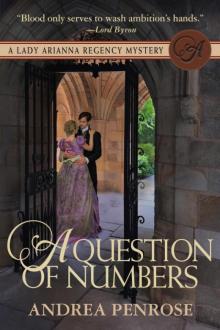 A Question of Numbers
A Question of Numbers Murder at Queen's Landing
Murder at Queen's Landing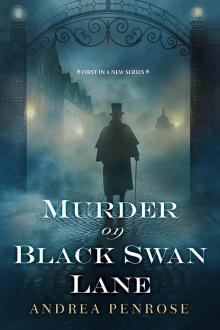 Murder on Black Swan Lane
Murder on Black Swan Lane Sweet Revenge
Sweet Revenge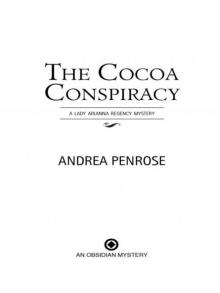 The Cocoa Conspiracy
The Cocoa Conspiracy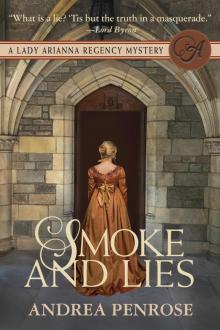 Smoke & Lies
Smoke & Lies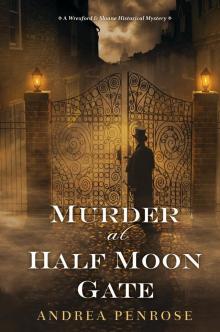 Murder at Half Moon Gate
Murder at Half Moon Gate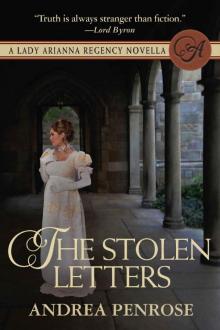 The Stolen Letters
The Stolen Letters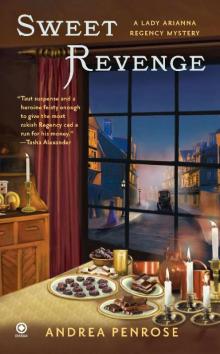 Sweet Revenge lahm-1
Sweet Revenge lahm-1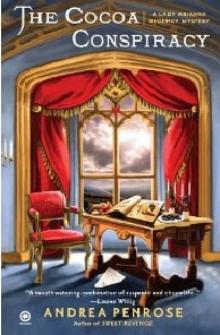 The Cocoa Conspiracy lahm-2
The Cocoa Conspiracy lahm-2